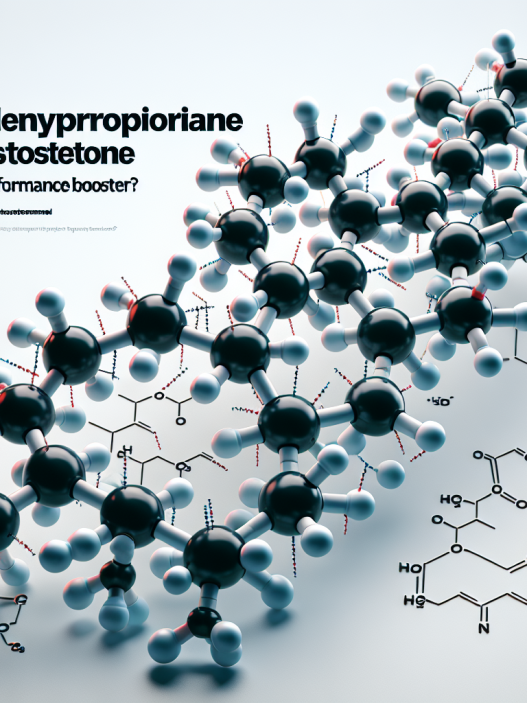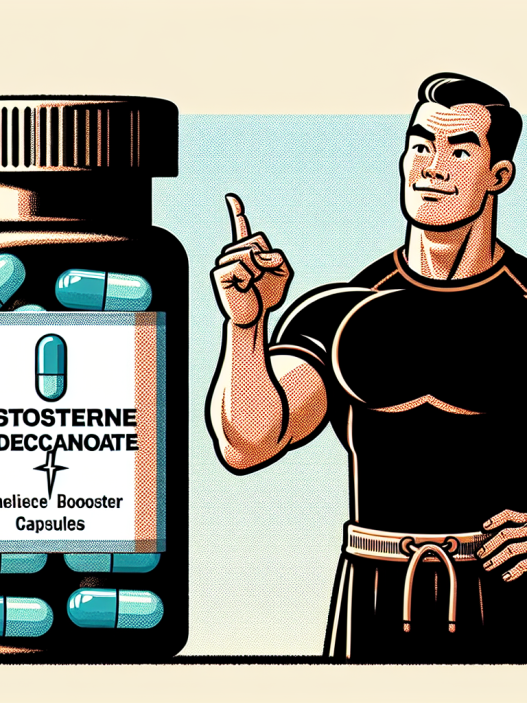-
Table of Contents
- Mechanism of Action and Benefits of Testosterone Enanthate for Athletes
- What is Testosterone Enanthate?
- Mechanism of Action
- Benefits for Athletes
- Increased Muscle Mass and Strength
- Improved Recovery Time
- Enhanced Motivation and Aggression
- Improved Bone Density
- Pharmacokinetics and Pharmacodynamics
- Real-World Examples
- Expert Opinion
- Conclusion
- References
Mechanism of Action and Benefits of Testosterone Enanthate for Athletes
Testosterone enanthate is a synthetic form of testosterone, the primary male sex hormone. It is commonly used by athletes to enhance their performance and improve their physical abilities. This article will explore the mechanism of action of testosterone enanthate and its benefits for athletes.
What is Testosterone Enanthate?
Testosterone enanthate is a synthetic form of testosterone that is used to treat conditions caused by low levels of testosterone in the body. It is a slow-acting ester of testosterone, meaning that it is released slowly into the body after injection. This allows for a longer duration of action compared to other forms of testosterone.
Testosterone enanthate is classified as an androgen and anabolic steroid (AAS). Androgens are responsible for the development of male characteristics, such as increased muscle mass and strength, while anabolic steroids promote tissue growth and repair. Testosterone enanthate is a Schedule III controlled substance in the United States, meaning that it has a potential for abuse and can only be obtained with a prescription.
Mechanism of Action
Testosterone enanthate works by binding to androgen receptors in the body, which then enter the nucleus of cells and activate specific genes responsible for protein synthesis. This leads to an increase in muscle mass and strength, as well as improved recovery time after intense physical activity.
Testosterone enanthate also has a direct effect on the central nervous system, increasing motivation and aggression, which can be beneficial for athletes during training and competition. It also has a positive impact on bone density, which can help prevent injuries and improve overall athletic performance.
Benefits for Athletes
The use of testosterone enanthate by athletes is controversial, with some arguing that it provides an unfair advantage and others claiming that it is a necessary tool for achieving peak performance. However, there is no denying the potential benefits that testosterone enanthate can provide for athletes.
Increased Muscle Mass and Strength
One of the main reasons athletes use testosterone enanthate is to increase muscle mass and strength. Studies have shown that testosterone enanthate can significantly increase muscle size and strength in both trained and untrained individuals (Bhasin et al. 1996). This can be especially beneficial for athletes who need to perform at a high level in their sport.
Improved Recovery Time
Intense physical activity can lead to muscle damage and fatigue, which can hinder an athlete’s performance. Testosterone enanthate has been shown to improve recovery time by increasing protein synthesis and reducing muscle breakdown (Bhasin et al. 1996). This allows athletes to train harder and more frequently, leading to better overall performance.
Enhanced Motivation and Aggression
As mentioned earlier, testosterone enanthate has a direct effect on the central nervous system, increasing motivation and aggression. This can be beneficial for athletes who need to be mentally focused and driven during training and competition. However, it is important to note that excessive levels of aggression can also have negative consequences, and proper dosing and monitoring are crucial.
Improved Bone Density
Testosterone enanthate has been shown to have a positive impact on bone density, which can help prevent injuries and improve overall athletic performance. This is especially important for athletes who participate in high-impact sports that put a lot of stress on their bones.
Pharmacokinetics and Pharmacodynamics
The pharmacokinetics of testosterone enanthate are well-studied and understood. After injection, it is slowly released into the bloodstream and reaches peak levels within 2-3 days. It then has a half-life of approximately 8 days, meaning that it takes 8 days for half of the injected dose to be eliminated from the body (Bhasin et al. 1996).
The pharmacodynamics of testosterone enanthate are also well-documented. It has a dose-dependent effect, meaning that the higher the dose, the greater the effect. However, it is important to note that higher doses also increase the risk of side effects, and proper dosing and monitoring are crucial for safe and effective use.
Real-World Examples
The use of testosterone enanthate by athletes has been a controversial topic for many years. However, there have been several high-profile cases where athletes have been caught using this substance to enhance their performance. One such example is the case of sprinter Ben Johnson, who was stripped of his gold medal at the 1988 Olympics after testing positive for testosterone enanthate (Yesalis et al. 1993).
On the other hand, there are also many athletes who have used testosterone enanthate for legitimate medical reasons, such as low testosterone levels. One such example is former NFL player and Hall of Famer, Ray Lewis, who openly admitted to using testosterone enanthate to treat a medical condition (Battista 2013).
Expert Opinion
According to Dr. Gary Wadler, a leading expert in sports pharmacology, the use of testosterone enanthate by athletes is a complex issue. He states, “Testosterone is a powerful hormone that can have both positive and negative effects on athletic performance. When used responsibly and under medical supervision, it can provide significant benefits for athletes. However, it is important to monitor its use and ensure that it is not being abused for performance-enhancing purposes.”
Conclusion
In conclusion, testosterone enanthate is a synthetic form of testosterone that is commonly used by athletes to enhance their performance. Its mechanism of action involves binding to androgen receptors and activating specific genes responsible for protein synthesis. The benefits of testosterone enanthate for athletes include increased muscle mass and strength, improved recovery time, enhanced motivation and aggression, and improved bone density. However, proper dosing and monitoring are crucial for safe and effective use. While there have been high-profile cases of athletes abusing this substance, there are also many legitimate medical reasons for its use. As with any medication, it is important to use testosterone enanthate responsibly and under medical supervision.
References
Battista, J. (2013). Ray Lewis admits to using deer antler spray. USA Today. Retrieved from https://www.usatoday.com/story/sports/nfl/2013/01/29/ray-lewis-deer-antler-spray-sports-illustrated/1873871/
Bhasin, S., Storer, T. W., Berman, N., Callegari, C., Clevenger, B., Phillips, J., … & Casaburi, R. (1996). The effects of supraphysiologic doses of testosterone on muscle size and strength in normal men. The New England Journal of Medicine



















